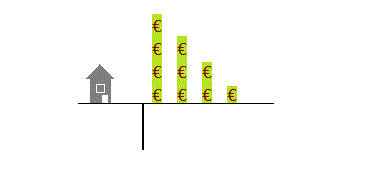
German residential market is booming due to extremely low interest rates and, respectively, very cheap mortgages. But if the rates grow, the market is going to crash! For instance, a current rate for 10 year mortgage without a downpayment is about 2%. A new rural house costs about €300000. A typical borrower can pay about €1000 monthly installment + €5000 extra redemption in the end of year. If the rate jumps to 4%, the house price will drop to €246303, i.e. 17.9% (this is just estimation, however, it is not implausible). And additionally the residual debt refinancing costs will increase by €31762 (this is a precise calculation).
(Click here to read the German version)
Contrary to USA, a German mortgager cannot just give back his real estate to a bank and become though "homeless" but also debt-free. In Germany in case of default a house will land to Zwangsversteigerung (compulsory auction) but if the paid auction price is not sufficient to cover the outstanding debt, a mortgager still have pay the rest. That's why there was no such "epidemic foreclosure" in Germany in 2008-2009, as it took place in USA.
The second nuance is that Germans are reluctant to borrowing at the floating rate, they prefer fixed rates. However, they rarely fix the rate so that they repay the mortgage completely (in this case the mortgage would last too long and, respectively, the rate would be too high). Rather, they take a fix rate mortgage for 10 years (at a cheaper rate) and after 10 years they take an Anschlusskredit (attached loan) to refinance the residual debt. So far, so good ... unless the the interest rates jump in between.
And if it happens, both the residual debt becomes more expensive and the house becomes cheaper. A bad risk concentration, so to say! Given the new rate, the new present value of the residual debt can be precisely calculated. As to the house price drop, it can only be estimated. For this we use the present value model, which is as follows:
1. We assume that a typical mortgager can pay a certain monthly installment (what remains from his salary after food-, car-, children- and other costs) and that he should completely amortize the mortgage before he retire.
2. Current house prices are so high that a typical mortgager have to pay virtually all life long until he redeems the debt completely.
Thus we assume that if the mortgage rate increase, the house prices will necessarily drop (from 1. and 2. it follows that neither installment, nor mortgage duration can be increased). Namely, they will drop exactly so that the new house price will be equal to the new present value of the mortgage. Of course it is just a model, but in our opinion it is not implausible.
You may (and of course are encouraged) to calculate some scenarios by yourself by means of our online mortgage calculator, which computes not only the amortization schedules but also the interest rate risk.
P.S. Also have a look at Five Lessons form the Big Short (Film).
FinViz - an advanced stock screener (both for technical and fundamental traders)
